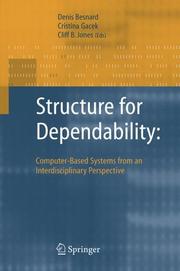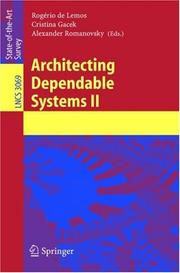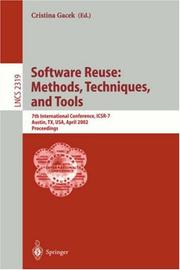| Listing 1 - 10 of 22 | << page >> |
Sort by
|

ISBN: 1846281113 1846281105 Year: 2006 Publisher: London : Springer,
Abstract | Keywords | Export | Availability | Bookmark
 Loading...
Loading...Choose an application
- Reference Manager
- EndNote
- RefWorks (Direct export to RefWorks)
This book breaks new ground by presenting an interdisciplinary approach to a crucial problem – system dependability. Computer-based systems include hardware, software and people. Achieving dependability for such systems requires an interdisciplinary approach. In Structure for Dependability: Computer-Based Systems from an Interdisciplinary Perspective, computer scientists, sociologists, statisticians and psychologists bring together their latest research on the structure of dependable computer-based systems. The result is a highly readable overview of ways to achieve dependability in large computer-based systems with practical advice on designing dependable systems. Work on structure for dependability has usually come from a single discipline and has been concerned only with the computer systems. Stakeholders and system designers now agree that human and social issues cannot be separated from technical matters. The approach taken in this book demonstrates that interdisciplinarity delivers real benefits in the design and deployment of complex computer-based systems. This book is one of the outcomes of a six year Interdisciplinary Research Collaboration. Topics covered include fault tolerance, system evolution, determining software specifications, HCI, architecture, certification, dependability arguments, organisations, diagrams, time and procedures. System developers, stakeholders, decision makers, policymakers and researchers will find this book a unique resource which highlights the core issues for all those involved in improving dependability in complex computer-based environments. .
Computer science. --- Software engineering. --- Computers. --- User interfaces (Computer systems). --- Computers and civilization. --- Computer Science. --- Computer Science, general. --- Software Engineering. --- Models and Principles. --- Information Systems Applications (incl. Internet). --- User Interfaces and Human Computer Interaction. --- Computers and Society. --- Reliability (Engineering) --- Human-computer interaction. --- Computer software engineering --- Engineering --- Computer-human interaction --- Human factors in computing systems --- Interaction, Human-computer --- Human engineering --- User-centered system design --- User interfaces (Computer systems) --- Reliability of equipment --- Systems reliability --- Maintainability (Engineering) --- Probabilities --- Systems engineering --- Plant performance --- Safety factor in engineering --- Structural failures --- Information Technology --- Computer Science (Hardware & Networks) --- Informatics --- Science --- Application software. --- Civilization and computers --- Civilization --- Interfaces, User (Computer systems) --- Human-machine systems --- Human-computer interaction --- Application computer programs --- Application computer software --- Applications software --- Apps (Computer software) --- Computer software --- Automatic computers --- Automatic data processors --- Computer hardware --- Computing machines (Computers) --- Electronic brains --- Electronic calculating-machines --- Electronic computers --- Hardware, Computer --- Computer systems --- Cybernetics --- Machine theory --- Calculators --- Cyberspace

ISBN: 3540231684 9783540259392 3540259392 Year: 2004 Publisher: Berlin, Heidelberg : Springer Berlin Heidelberg : Imprint: Springer,
Abstract | Keywords | Export | Availability | Bookmark
 Loading...
Loading...Choose an application
- Reference Manager
- EndNote
- RefWorks (Direct export to RefWorks)
As software systems become ubiquitous, the issues of dependability become more and more critical. Given that solutions to these issues must be taken into account from the very beginning of the design process, it is appropriate that dependability is addressed at the architectural level. This book results from an effort to bring together the research communities of software architectures and dependability. Inspired by the ICSE 2003 Workshop on Software Architectures for Dependable Systems, the book focuses on topics relevant to improving the state of the art in architecting dependable systems. The 15 thoroughly reviewed papers originate partly from the workshop; others were solicited in order to achieve complete coverage of all relevant aspects. The papers are organized into topical sections on architectures for dependability, fault-tolerance in software architectures, dependability analysis in software architectures, and industrial experience.
Computer architecture. --- Computer systems --- Fault-tolerant computing. --- Reliability. --- Computing, Fault-tolerant --- ADP systems (Computer systems) --- Computing systems --- Architecture, Computer --- Systems, Computer --- Computer science. --- Software engineering. --- Operating systems (Computers). --- Computer Science. --- Software Engineering. --- Operating Systems. --- Computer architecture --- Fault-tolerant computing --- Electronic data processing --- Electronic digital computers --- Fault tolerance (Engineering) --- Computer system failures --- Electronic systems --- Cyberinfrastructure --- Reliability --- Computer operating systems --- Computers --- Disk operating systems --- Systems software --- Computer software engineering --- Engineering --- Informatics --- Science --- Operating systems
Book
ISBN: 364217244X 9786613568366 3642172458 1280390441 Year: 2010 Publisher: Berlin : Springer,
Abstract | Keywords | Export | Availability | Bookmark
 Loading...
Loading...Choose an application
- Reference Manager
- EndNote
- RefWorks (Direct export to RefWorks)
As software systems become increasingly ubiquitous, issues of dependability become ever more crucial. Given that solutions to these issues must be considered from the very beginning of the design process, it is clear that dependability and security have to be addressed at the architectural level. This book, as well as its six predecessors, was born of an effort to bring together the research communities of software architectures, dependability, and security. This state-of-the-art survey contains expanded, peer-reviewed papers based on selected contributions from the Workshop on Architecting Dependable Systems (WADS 2009), held at the International Conference on Dependable Systems and Networks (DSN 2009), as well as a number of invited papers written by renowned experts in the area. The 13 papers are organized in topical sections on: mobile and ubiquitous systems, architecting systems, fault management, and experience and vision.
Computer architecture --- Computer systems --- Service-oriented architecture (Computer science) --- Engineering & Applied Sciences --- Computer Science --- Reliability --- Information Technology --- Software Engineering --- Fault-tolerant computing --- Computer science. --- Software engineering. --- Computer programming. --- Programming languages (Electronic computers). --- Computer logic. --- Computers. --- Computer Science. --- Software Engineering/Programming and Operating Systems. --- Software Engineering. --- Programming Languages, Compilers, Interpreters. --- Programming Techniques. --- Logics and Meanings of Programs. --- Models and Principles. --- Automatic computers --- Automatic data processors --- Computer hardware --- Computing machines (Computers) --- Electronic brains --- Electronic calculating-machines --- Electronic computers --- Hardware, Computer --- Cybernetics --- Machine theory --- Calculators --- Cyberspace --- Computer science logic --- Logic, Symbolic and mathematical --- Computer languages --- Computer program languages --- Computer programming languages --- Machine language --- Electronic data processing --- Languages, Artificial --- Computers --- Electronic computer programming --- Electronic digital computers --- Programming (Electronic computers) --- Coding theory --- Computer software engineering --- Engineering --- Informatics --- Science --- Programming --- Logic design. --- Design, Logic --- Design of logic systems --- Digital electronics --- Electronic circuit design --- Logic circuits --- Switching theory

ISSN: 03029743 ISBN: 3540434836 9783540434832 3540460209 Year: 2002 Volume: 2319 Publisher: Berlin, Heidelberg : Springer Berlin Heidelberg : Imprint: Springer,
Abstract | Keywords | Export | Availability | Bookmark
 Loading...
Loading...Choose an application
- Reference Manager
- EndNote
- RefWorks (Direct export to RefWorks)
As a result of the open-source movement there is now a great deal of reusable software available in the public domain. This offers significant functionality that commercial software vendors can use in their software projects. Open-source approaches to software development have illustrated that complex, mission critical software can be developed by distributed teams of developers sharing a common goal. Commercial software vendors have an opportunity to both learn from the op- source community as well as leverage that knowledge for the benefit of its commercial clients. Nonetheless, the open-source movement is a diverse collection of ideas, knowledge, techniques, and solutions. As a result, it is far from clear how these approaches should be applied to commercial software engineering. This paper has looked at many of the dimensions of the open-source movement, and provided an analysis of the different opportunities available to commercial software vendors. References and Notes 1. It can be argued that the open-source community has produced really only two essential 9 products -- Apache (undeniably the most popular web server) and Linux although both are essentially reincarnations of prior systems. Both are also somewhat products of their times: Apache filled a hole in the then emerging Web, at a time no platform vendor really knew how to step in, and Linux filled a hole in the fragmented Unix market, colored by the community s general anger against Microsoft. 2.Evans Marketing Services, Linux Developers Survey, Volume 1, March 2000.
681.3*2.13 --- Computer software --- -Software, Computer --- Computer systems --- Computerwetenschap--?*2.13 --- Reusability --- Computer science. --- Software engineering. --- Computer programming. --- Management information systems. --- Computer Science. --- Software Engineering/Programming and Operating Systems. --- Software Engineering. --- Management of Computing and Information Systems. --- Programming Techniques. --- Computer-based information systems --- EIS (Information systems) --- Executive information systems --- MIS (Information systems) --- Sociotechnical systems --- Information resources management --- Management --- Computers --- Electronic computer programming --- Electronic data processing --- Electronic digital computers --- Programming (Electronic computers) --- Coding theory --- Computer software engineering --- Engineering --- Informatics --- Science --- Communication systems --- Programming --- Information Systems. --- Computer software - Reusability - Congresses
Digital
ISBN: 9783540316480 Year: 2005 Publisher: Berlin Heidelberg Springer-Verlag GmbH
Abstract | Keywords | Export | Availability | Bookmark
 Loading...
Loading...Choose an application
- Reference Manager
- EndNote
- RefWorks (Direct export to RefWorks)
Digital
ISBN: 9781846281112 Year: 2006 Publisher: London Springer-Verlag London Limited
Abstract | Keywords | Export | Availability | Bookmark
 Loading...
Loading...Choose an application
- Reference Manager
- EndNote
- RefWorks (Direct export to RefWorks)
Computer science --- Information systems --- Computer. Automation --- ICT (informatie- en communicatietechnieken) --- informatica --- maatschappij --- informatiesystemen --- software engineering
Digital
ISBN: 9783540740353 Year: 2007 Publisher: Berlin, Heidelberg Springer-Verlag Berlin Heidelberg
Abstract | Keywords | Export | Availability | Bookmark
 Loading...
Loading...Choose an application
- Reference Manager
- EndNote
- RefWorks (Direct export to RefWorks)
Book
Year: 2005 Publisher: Berlin : Springer,
Abstract | Keywords | Export | Availability | Bookmark
 Loading...
Loading...Choose an application
- Reference Manager
- EndNote
- RefWorks (Direct export to RefWorks)
As software systems become ubiquitous, the issues of dependability become more and more crucial. Given that solutions to these issues must be considered from the very beginning of the design process, it is reasonable that dependability is addressed at the architectural level. This book comes as a result of an effort to bring together the research communities of software architectures and dependability. This state-of-the-art survey contains 16 carefully selected papers originating from the Twin Workshops on Architecting Dependable Systems (WADS 2004) accomplished as part of the International Conference on Software Engineering (ICSE 2004) in Edinburgh, UK and of the International Conference on Dependable Systems and Networks (DSN 2004) in Florence, Italy. The papers are organised in topical sections on architectures for dependable services, monitoring and reconfiguration in software architectures, dependability support for software architectures, architectural evaluation, and architectural abstractions for dependability.
Computers. --- Software engineering. --- Operating systems (Computers). --- Theory of Computation. --- Software Engineering. --- Operating Systems. --- Computer architecture. --- Computer systems --- Fault-tolerant computing. --- Reliability.
Book
Year: 2005 Publisher: Berlin : Springer,
Abstract | Keywords | Export | Availability | Bookmark
 Loading...
Loading...Choose an application
- Reference Manager
- EndNote
- RefWorks (Direct export to RefWorks)
As software systems become ubiquitous, the issues of dependability become more and more crucial. Given that solutions to these issues must be considered from the very beginning of the design process, it is reasonable that dependability is addressed at the architectural level. This book comes as a result of an effort to bring together the research communities of software architectures and dependability. This state-of-the-art survey contains 16 carefully selected papers originating from the Twin Workshops on Architecting Dependable Systems (WADS 2004) accomplished as part of the International Conference on Software Engineering (ICSE 2004) in Edinburgh, UK and of the International Conference on Dependable Systems and Networks (DSN 2004) in Florence, Italy. The papers are organised in topical sections on architectures for dependable services, monitoring and reconfiguration in software architectures, dependability support for software architectures, architectural evaluation, and architectural abstractions for dependability.
Computers. --- Software engineering. --- Operating systems (Computers). --- Theory of Computation. --- Software Engineering. --- Operating Systems. --- Computer architecture. --- Computer systems --- Fault-tolerant computing. --- Reliability.
Book
Year: 2005 Publisher: Berlin : Springer,
Abstract | Keywords | Export | Availability | Bookmark
 Loading...
Loading...Choose an application
- Reference Manager
- EndNote
- RefWorks (Direct export to RefWorks)
As software systems become ubiquitous, the issues of dependability become more and more crucial. Given that solutions to these issues must be considered from the very beginning of the design process, it is reasonable that dependability is addressed at the architectural level. This book comes as a result of an effort to bring together the research communities of software architectures and dependability. This state-of-the-art survey contains 16 carefully selected papers originating from the Twin Workshops on Architecting Dependable Systems (WADS 2004) accomplished as part of the International Conference on Software Engineering (ICSE 2004) in Edinburgh, UK and of the International Conference on Dependable Systems and Networks (DSN 2004) in Florence, Italy. The papers are organised in topical sections on architectures for dependable services, monitoring and reconfiguration in software architectures, dependability support for software architectures, architectural evaluation, and architectural abstractions for dependability.
Computers. --- Software engineering. --- Operating systems (Computers). --- Theory of Computation. --- Software Engineering. --- Operating Systems. --- Computer architecture. --- Computer systems --- Fault-tolerant computing. --- Reliability.
| Listing 1 - 10 of 22 | << page >> |
Sort by
|

 Search
Search Feedback
Feedback About UniCat
About UniCat  Help
Help News
News